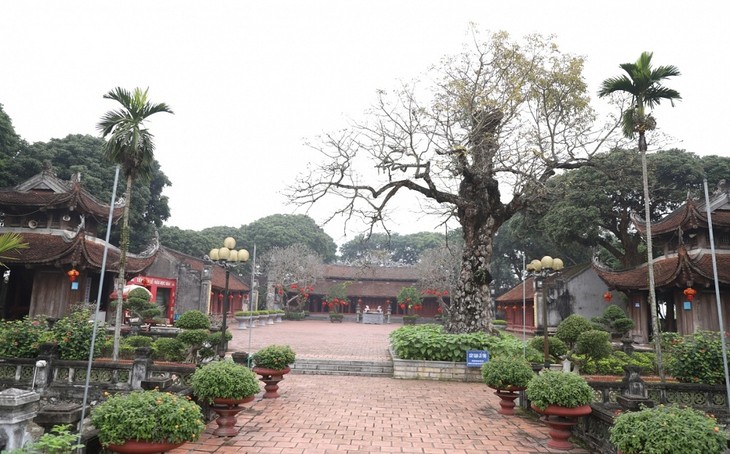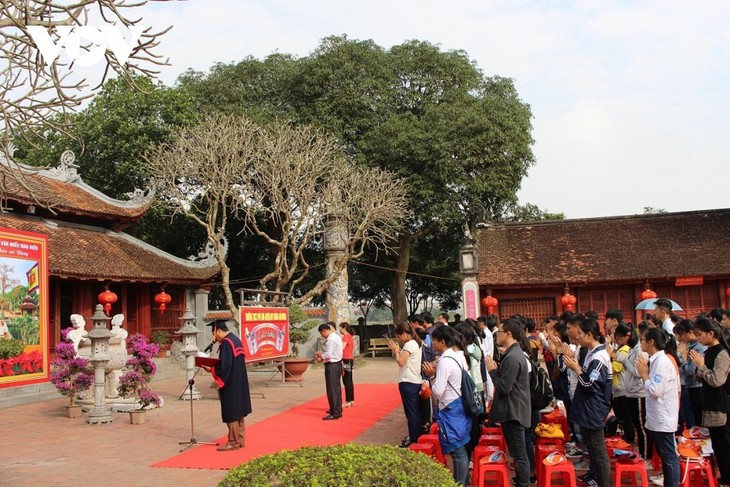(VOVWORLD)-Hai Duong is famous for its tradition of studiousness and academic excellence. Over the years it has produced the most winners at scholarly examinations in Vietnam. Hai Duong’s tradition of studying has been documented in history books and honored at many historical relic sites. Today “Discovery Vietnam” invites you join a "Vietnam Examination Journey" to Hai Duong province for a closer look at its people and traditions.
 Mao Dien Temple of Literature in Hai Duong province (Photo: VOV) Mao Dien Temple of Literature in Hai Duong province (Photo: VOV) |
Hai Duong province has some 3,200 historical and cultural relics and scenic spots. Many of the relic sites are associated with an academic history that is unequaled anywhere else. The historical, cultural, and architectural values of these relic sites inspired a unique tourism product called "Vietnam Examination Journey".
This journey connects the Mo Trach Doctorate village, the Mao Dien Temple of Literature, the Temple of the First Doctor Mac Dinh Chi, the Temple of teacher Chu Van An, and the Temple of female Doctor Nguyen Thi Due.
In the first days of the year, Mao Dien Temple of Literature attracts crowds of visitors, including many students, who come to learn about its history. The Temple was built in the early Le Dynasty in the 15th century. This place held exams to identify intellectuals in Hai Duong and the area east of the Thang Long citadel. Eventually Mao Dien Temple of Literature became an examination center for the entire region.
Ha Quang Thanh, head of the Management Board of Mao Dien Temple of Literature, said: “Last year we welcomed 25,000 visitors, including people from Hai Duong and other neighboring provinces like Hai Phong, Quang Ninh, and Hung Yen. Visitors offer incense and listen to a talk about the relic and its famous scholars, then visit the area where in the past the examiners sat in tents and conducted the exams.”
 Schools organize events for pupils at historical sites. (Photo: VOV) Schools organize events for pupils at historical sites. (Photo: VOV) |
The "Vietnam Examinations Journey" visits the Mo Trach Doctorate village, the Temple of teacher Chu Van An (1292-1370), the temple of Doctor Mac Dinh Chi (1272-1346), and the temple of Nguyen Thi Due (1574-1654), the first female Doctor in Vietnam.
These destinations commemorate the scholarly tradition of the region, which in the feudal era produced 500 Confucian doctors.
Vu Quoc Ai of the Management Board of Mo Trach Communal House says the village is called Mo Trach Doctorate village because it produced 36 Doctors, more than any other village.
“3,000 people took the national examinations in 1656. The King selected 6 Doctors. When the Gold Board was announced, Mo Trach village had 3 Doctors from the Vu clan. King Tu Duc praised the village where a single clan produced half the nation’s Doctors,” said Ai.
The “Vietnam Examinations Journey”, part of Hai Duong’s tourism development program for the 2021-2030 period, with a vision to 2050, has attracted a lot of tourists. Schools in Hai Duong and other provinces have taken pupils on the tour to teach them history, inspire them to study harder, and reward those with good academic results.
Pham Thi Bao, the Principal of Hung Thang Primary School, said that, after taking the tour, his pupils wrote about their experience. “The pupils were very excited. They took notes of what they heard and saw. Then they wrote about their experience and the pride they felt in their cultural traditions. They were inspired to study harder and follow the example of previous generations,” said teacher Bao.
Academic tourism is a unique tourism product of Hai Duong. Do Van Dan, head of Culture and Information Department of Binh Giang district, said, “The provincial Department of Culture, Sports, and Tourism should further promote this tour and work with schools to inspire children to learn more about their homeland by visiting historical sites.”